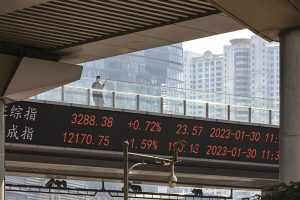BLOOMBERG
Chinese stocks extended losses as mainland banks surprisingly kept a key interest rate tied to mortgages on hold, in a move that raised doubts over the country’s commitment to support the embattled property sector.
The Hang Seng China Enterprises Index, which tracks Chinese stocks listed in Hong Kong, slumped 1.9% to the lowest since November. The Hang Seng Index, which fell into a bear market on Friday, slid for a seventh straight day, the longest losing streak since November 2021.
The five-year loan prime rate was unexpectedly held steady at 4.2% on Monday, when most economists had predicted the rate to be cut by 15 basis points following a similar reduction last week to a key policy rate. The disappointment intensified a selloff as traders were hoping for stimulus to gather pace. Financials were among the top losers as the move was seen to reflect lenders’ rising concerns over their profit margins.
Heeding calls from authorities to bolster the market, China’s largest mutual fund houses promised to buy their own equity-focused products. At least 14 firms pledged to invest in their funds as of mid-Monday, taking the total tally to 870 million yuan ($119 million).
The planned purchases come on the heels of renewed vows from the securities watchdog to boost markets, including cuts to stock handling fees and consideration to extend trading hours. Mainland exchanges asked some investment funds to avoid net selling equities. Officials also requested state-owned banks to escalate intervention to support the yuan, while also encouraging companies listed on the tech-heavy Star Board to buy back shares. So far, the measures have yet to revive the market. The CSI 300 Index shed 7.1% this month, underperforming most of the global benchmarks.
 The Gulf Time Newspaper One of the finest business newspapers in the UAE brought to you by our professional writers and editors.
The Gulf Time Newspaper One of the finest business newspapers in the UAE brought to you by our professional writers and editors.
